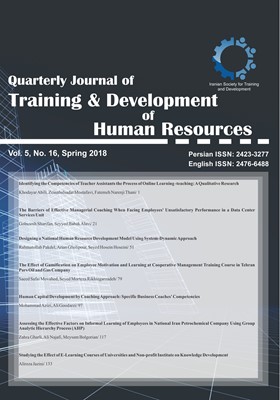کاربست مفاهیم دانش مدیریت آموزشی در سیستمهـای غیرآموزشی (مورد مطالعه: صنعت چاپ و نشر ایران)
الموضوعات :
1 - دانشگاه آزاداسلامی واحد تنکابن
2 - دانشگاه آزاداسلامی واحد تنکابن
الکلمات المفتاحية: اربست, دانش مدیریت آموزشی, سیستمهای غیرآموزشی, صنعت چاپ و نشر ایران, پدیدارشناسی, کلایزی.,
ملخص المقالة :
هدف پژوهش حاضر بررسی این پرسش اساسی است که با توجه به تغییرات گسترده در تکنولوژی، کدام جنبه از مفاهیم و فرایندهای دانش مدیریت آموزشی، در صنعت چاپ و نشرکاربرد بیشتری دارد و لازم است جهت استقرار یک سیستم آموزشی کارآمد در این صنعت در اولویت قرار گیرند؟ نوع مطالعه کیفی با رویکرد پدیدارشناسی بویژه تحلیل تجربه زیسته بود. مشارکت کنندگان اين پژوهش از طریق نمونهگیری هدفمند از نوع گلوله برفی تا مرز اشباع نظری، 8 تن از صاحب نظران عرصه آموزش های سازمانی و متخصصین و فعالین شناخته شده صنعت چاپ و نشر بودند. در این پژوهش جهت استحکام پایایی تحقیق از قابلیت وابستگی، باورپذیری و تأیید پذیری استفاده شد. دادههای حاصل از بازخوانی مصاحبهها در این پژوهش، با استفاده از روش هفت مرحلهای کلایزی مورد تجزیه و تحلیل قرار گرفتند. براساس نتایج حاصل از کدگذاری، 37 مؤلفه بازشناسی شدند که در 13 موضوع استنباطی قابل خوشه بندی بودند. در نهایت 6 سازه استاندارد سازی بستههای برنامههای درسی، متنوع سازی سیستمهای عرضه آموزش، بسط زیبایی شناسانه آموزش، بازاریابی و برندسازی، لجستیک جامع و مؤثر و نیز پایش مستمر مبتنی بر نرخ بازگشت سرمایه در آموزشهای صنعت چاپ و نشر ایران به عنوان بخشی از مفاهیم دانش مدیریت آموزشی تمیابی شدند. تحلیلهای ارائه شده در این پژوهش نشان میدهد کاربست مفاهیم اشاره شده، بهرهوری صنعت چاپ و نشر را در شرایط تغییرات گسترده درونی و بیرونی این صنعت ارتقاء خواهد داد.
1. English F.W. A Typology of Metanarratives in Educational Administration. Educational Leadership and Administration. 1, 2009.
2. Henry P. Apprenticeship, Training, and Skills Development in the Printing Industry: An Appraisal. Available from: http://whattheythink.com/articles/82807-apprenticeship-training-skills-development-printing-industry/. 2016.
3. Fardanesh H, Karami M. Identifying the optimal training design pattern for industrial training. Quarterly Curriculum Studies.8,: 106. 2008.
4. Training and development. In Wikipedia, the Free Encyclopedia. Retrieved 08:30, July 4, 2017, Available from https://en.wikipedia. org/w/index.php? Title= Training_and_development&oldid=788343501. 2017, June 30.
5. Jarvinen J. Dynamics of ecological interdependences between European paper & pulp and printing & publishing industries, 1950-2005, Department of Industrial Engineering and Management, Aalto University publication series DOCTORAL DISSERTATIONS 44/2011. 2011.
6. Osmond P. Graphic Communication Industry Training: A critical Comparison of Knowledge Gained and Satisfaction of Learners Between On-site Delivery and Web-based Delivery. Doctor of Philosophy Dissertation. Idaho: University of Idaho. 2002
7. Bramble J. Training Needs for the Book Publishing and Printing Industries. In B. Cope, & R. Freeman, Developing Knowledge Workers in Printing and Publishing Industries. Altona. Vic: Common Ground Publishing. 2002.
8. Parhizgar M. Darini, Vali M. Design and Explain the Models Based on the Paradigm of Open Innovation. Culture-Communication Studies, Fourteenth, (23) : 217-240. 2013.
9. Ghayour Baghbani, Seyed Morteza; Behboudi, Omid. And Nategh Golestan, Ahmad. Learning organization and realization of organizational learning in the field of book publishing. Publishing, third year (8): 15-23. 2013.
10. Nikdast, Arash. And Khalekhizadeh, Kambiz. How to formulate strategic planning in the printing industry for printing and packaging complexes. Chaponashr, second year, (3): 61-72. 2012.
11. Cramer, S. S. Attitudes, Receptions and the Effectiveness of Computer-mediated Distance Training for Customer Service Representatives in the Printing Industry. Doctor of Philosophy Dissertation. South Carolina: Clemson University. 2000.
12. Bazargan, Abbas. An Introduction to Qualitative and mixed methods research. Common Approaches to Behavioral Sciences. Tehran: Didar. 2012.
13. Creswell, JW, Plano Clark VL. Designing and conducting mixed methods research 2ndeddition ed. Thousand Oaks, CA: Sage. 2012
14. Jalali, Rustam, Qualitative Research Sampling, Journal of Qualitative Research in Health Sciences, first year. 4 : 320-310. 2012.
15. Kostere, K., & Percy, B. Five approaches to qualitative research in general psychology. Unpublished manuscript, Capella University, Minneapolis, MN. 2006.
16. Colaizzi, P. F. Psychological research as the phenomenologist views it. In R. S. Valle & M. King (Eds.), Existential-Phenomenological Alternatives for Psychology (48-71). New York, NY: Oxford University Press. 1978.
17. Roshandal Arbatani, Taher; Ameli; Saeed Reza and Hajijafari, Mojtaba. feasibility of using content for use in content marketing processes; Case study digikala, Journal of Modern Media Studies, 2008. 7: 157-190. 2016.
18. Hosseini Chegeni, Elham. Malekakhlagh, Esmaeel. Nopasand. Mohamad. The Effects of Marketing Mix Elements on Brand Equity in the educational institiution. New Marketing Research, 3 (3): 59-74. 2013.
19. Abraghuei, Nasser Sadra. , Ahmadi Nadoushen, Mahdi. , Safaridrbarzi, Ali. And Neamati Benadak, Ahmad Reza. The marketing mix of infrastructure training institutes in the development of services. Two Quarterly Journal of Research in Business Management System, Sixth Year. 12 :42-19. 2014
20. Mohammadpour Zarandi, Hossein and Taghavifard, Mohammad Taqi. Calculation the Return on Investment Rate (ROI) of the Specialized Courses of Tehran Municipality. IUESA. 2014; 2 (8) :1-16. 2013.
21. Moeini, Ali and Merati, Ehsan. A Method for Developing Enterprise Architecture Frameworks: An Interpretive Phenomenology Study, 7, 1:143-162. 2015.
22. Danaeifar, Hassan And Imami, Seyed Mojtaba. Strategies for Qualitative Research: Management Quarterly. 3. 2007.
23. Industrial Iran Print. Evaluating the Directors of Two European Suppliers of Print Essentials from the Iranian Printing Industry. Recover from http://www.iranprint.com/en/mag/inmag.php?id=2284. 2013.


